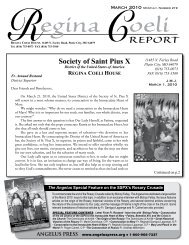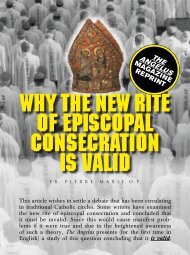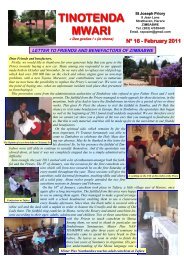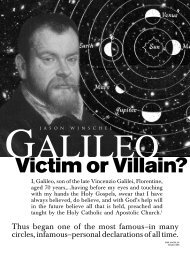Is Feeneyism Catholic? - Society of St. Pius X
Is Feeneyism Catholic? - Society of St. Pius X
Is Feeneyism Catholic? - Society of St. Pius X
You also want an ePaper? Increase the reach of your titles
YUMPU automatically turns print PDFs into web optimized ePapers that Google loves.
A NSWER TO OBJECTIONS 113<br />
stance, the headlines for the Worcester Telegram, a widely read<br />
Massachusetts newspaper, declared on September 2, 1949, “Vatican<br />
Rules Against Hub Dissidents: Holds No Salvation Outside<br />
Church Doctrine to Be False.” 165<br />
However, instead <strong>of</strong> refusing to sign this letter, it seems to me<br />
that one should have rather shown how abusive such an interpretation<br />
is.<br />
Indeed, the letter states unambiguously the necessity <strong>of</strong> “a supernatural<br />
faith” with “perfect charity.” 166 In the light <strong>of</strong> this last<br />
paragraph, it becomes clear that “invincible ignorance” does not<br />
mean ignorance <strong>of</strong> all the truths <strong>of</strong> Faith, but rather <strong>of</strong> some particular<br />
ones such as the truth about baptism. If one does not take<br />
a passage <strong>of</strong> that letter out <strong>of</strong> its context (as the Liberals do), but<br />
rather reads it as a whole, especially in light <strong>of</strong> the last paragraph<br />
and <strong>of</strong> the whole previous pronouncements <strong>of</strong> the popes, Doctors<br />
and Fathers, it teaches pure <strong>Catholic</strong> doctrine!<br />
In a similar way, if a <strong>Catholic</strong> author has an ambiguous statement,<br />
he should be interpreted in light <strong>of</strong> the whole <strong>of</strong> <strong>Catholic</strong><br />
doctrine. For instance, Fr. Feeney “objected to that in the Baltimore<br />
Catechism which he foresaw as dangerous to the Faith,” 167<br />
where the Catechism says:<br />
Q.632. Where will persons go who–such as infants–have not<br />
committed actual sin and who, through no fault <strong>of</strong> theirs, die<br />
without baptism?<br />
This applies to all those who have never had the use <strong>of</strong> their<br />
reason, i.e., infants and insane persons from birth. This does not<br />
apply to those who have had the use <strong>of</strong> their reason; indeed, <strong>St</strong>.<br />
Thomas teaches:<br />
When man begins to have the use <strong>of</strong> reason, he is not entirely<br />
excused from the guilt <strong>of</strong> venial or mortal sin. Now the first<br />
thing that occurs to a man to think about then, is to deliberate<br />
about himself. And if he then direct himself to the due end, he<br />
will, by means <strong>of</strong> grace, receive the remission <strong>of</strong> original sin:<br />
whereas if he does not then direct himself to the due end, as far<br />
165<br />
Letter to the Holy Office, June 28, 1985.<br />
166<br />
The Church Teaches, (Rockford, IL: TAN Books and Publishers, 1973)<br />
No.280.<br />
167<br />
“Reply to Verbum,” Res Fidei, February 1987, p.25.











